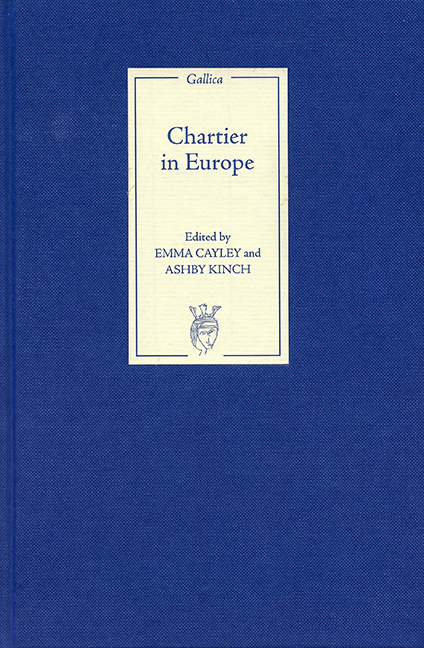Book contents
- Frontmatter
- Contents
- Foreword
- List of Contributors
- Acknowledgements
- List of Abbreviations
- Introduction
- Part I Authorising Chartier
- Part II Transmitting Chartier
- Part III Translating Chartier
- 8 From Invectivo to Inventivo: Reading Chartier's Quadrilogue invectif in Fifteenth-Century Castile
- 9 William Worcester Reads Alain Chartier: Le Quadrilogue invectif and its English Readers
- 10 The dit amoureux, Alain Chartier, and the Belle Dame sans mercy Cycle in Scotland: John Rolland's The Court of Venus
- 11 ‘La Crudele in amore’: Carlo del Nero Reads La Belle Dame sans mercy
- Bibliography
- Index
- Miscellaneous Endmatter
10 - The dit amoureux, Alain Chartier, and the Belle Dame sans mercy Cycle in Scotland: John Rolland's The Court of Venus
from Part III - Translating Chartier
Published online by Cambridge University Press: 24 October 2017
- Frontmatter
- Contents
- Foreword
- List of Contributors
- Acknowledgements
- List of Abbreviations
- Introduction
- Part I Authorising Chartier
- Part II Transmitting Chartier
- Part III Translating Chartier
- 8 From Invectivo to Inventivo: Reading Chartier's Quadrilogue invectif in Fifteenth-Century Castile
- 9 William Worcester Reads Alain Chartier: Le Quadrilogue invectif and its English Readers
- 10 The dit amoureux, Alain Chartier, and the Belle Dame sans mercy Cycle in Scotland: John Rolland's The Court of Venus
- 11 ‘La Crudele in amore’: Carlo del Nero Reads La Belle Dame sans mercy
- Bibliography
- Index
- Miscellaneous Endmatter
Summary
Hugh MacDiarmid, the father of the modern Scottish Renaissance, proclaimed: ‘Not Burns – Dunbar!’ By this he meant that the most authentic model for a modern resurgence ought not to be associated with Robert Burns and his epigones but with the Makars of the later Middle Ages. C. S. Lewis opined that the best literature in Great Britain, after Chaucer and prior to Spenser, comes from Scotland. That literature – written in Scots, generally recognized today to be an independent Anglic language related to English much as Occitan (Provençal) is to French – stands out as a major element in Scottish Studies; it has also been investigated thoroughly by medieval Anglicists. Of course, for three hundred years after the Conquest, French was the language of the upper classes in England, the language of the court, international commerce, the law, and along with Latin, of belles-lettres. Although less pervasive in Scotland, and with major Scottish writing coming under a strong English influence, French remained a powerful focus for all literature in the vernacular. This state of affairs continued in the sixteenth and early seventeenth centuries as the Renaissance arrived in Scotland by way of France, Italy, and England, and the Reformation by way of England, France, and Switzerland. James VI/I himself was an active writer, in verse and in prose, and translated and adapted from French works, including The Uranie and The Furies from Du Bartas, and a treatise on Scots versification from Du Bellay's Deffence et Illustration.
Specialists in Scottish literature were always aware of the French connection. Janet Smith published a meticulous analysis of the French sources for the medieval period. More recently, Helena Shire gave us a sensitive, very well-informed study on poetry and music, especially French, at the Stewart court.4 In general, however, scholars have moved in other directions. John MacQueen oriented the profession toward the Latin, with powerful Christian readings of texts. R. D. S. Jack also published two very important books on the contribution of Italian.
In my opinion, it is now time to reconsider the French. This article forms part of a much longer study on the French presence in the literature of medieval and Renaissance Scotland, to follow my study of the French presence in medieval England.
- Type
- Chapter
- Information
- Chartier in Europe , pp. 149 - 164Publisher: Boydell & BrewerPrint publication year: 2008

